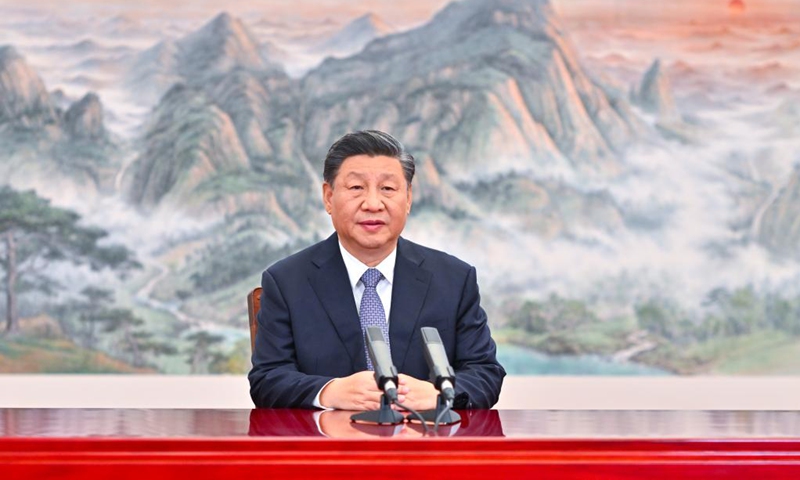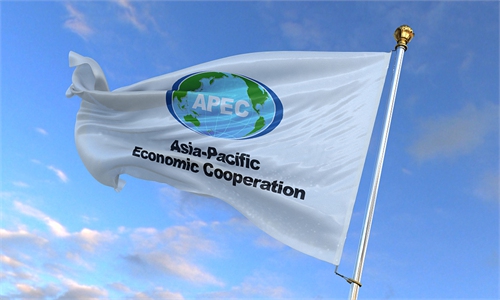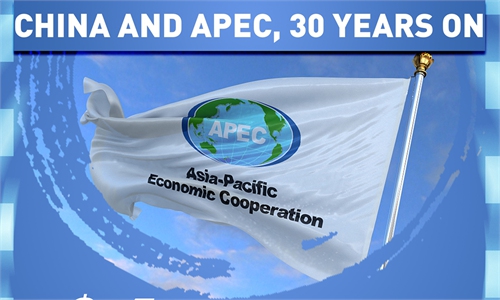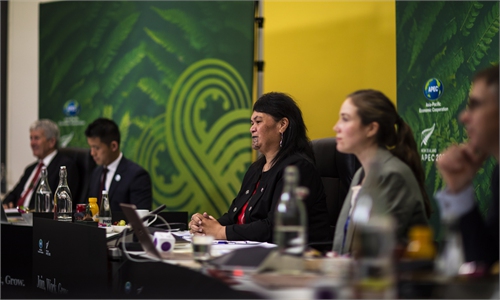Xi calls for concerted APEC efforts to combat virus, accelerate green growth, but avert forming 'small circles'

Chinese President Xi Jinping delivers a keynote speech at the Asia-Pacific Economic Cooperation (APEC) CEO Summit via a prerecorded video, in Beijing, capital of China, Nov. 11, 2021.(Photo: Xinhua)
Chinese President Xi Jinping called for concerted effort to combat COVID-19 in the Asia-Pacific community, abandoning forming small circles on geopolitical grounds, while reaffirmed the country's pledges of green transition and opening-up policy during his keynote speech delivered at the APEC CEO Summit via a prerecorded video on Thursday.
Xi's speech not only suggested fighting against the coronavirus pandemic and boosting the Asia-Pacific region's economic growth and integration through cooperation, but stressed China's pledge to continue opening up and reach carbon neutrality, demonstrating the country's commitment to fulfill its responsibility as a global and regional major power in promoting cooperation, analysts said.
Xi suggested "all-out efforts to fight COVID-19" during his speech. He called for cooperation in areas such as testing methods, treatment medicine and the research, development, production and mutual recognition of vaccines to truly create synergy against COVID-19.
"We should translate the consensus that vaccines are a global public good into concrete actions, ensure their fair and equitable distribution as well as their accessibility and affordability in developing countries, and thus work together to close the immunization gap," he said.
Against the backdrop of rising protectionism in tandem with the pandemic assault, Xi encouraged APEC member countries to adopt a "broad-minded" and "forward-looking" mentality.
"Attempts to draw ideological lines or form small circles on geopolitical grounds are bound to fail. The Asia-Pacific region cannot and should not relapse into the confrontation and division of the Cold War era," he said in the speech, underscoring that openness and cooperation should be upheld.
The remarks targeted some countries that embrace protectionism, unilateralism and "small circles" under the cover of multilateralism, and in fact, a trend of Cold War-style "ugly competition" is emerging in the region, which does not conform to the common benefits of member countries within APEC, Jiang Yuechun, director of the Department for World Economy and Development Studies at the China Institute of International Studies, told the Global Times on Thursday.
"The Summit is also a good opportunity for China and many other APEC members to cement good relations, especially for countries that have stayed neutral between the US and China, or that have consistently supported China's policies," Song Guoyou, deputy director of the Center for American Studies at Fudan University, told the Global Times.
There are tensions existing among certain APEC members, analysts say. For instance, Australia has closely followed the steps of the US government, and with constant unreasonable provocations against China.
Green push pledge
While after the world's major economies pledged to battle against climate change at the COP26 conference in Glasgow, Xi said that developed economies should act on a sense of being in the same community with other economies, provide developing economies with funding and technological support and help them enhance their capacity to conduct environmental governance.
Reaffirming that "China will fully implement its national strategy on climate change response," Xi said the country will strike a balance between low-carbon transition and ensuring the living needs of its people, and between development and carbon reduction.
China plans to see its carbon dioxide emissions peak before 2030 and do its utmost to become carbon neutral before 2060.
Xi also noted the country's carbon reduction action is a profound economic and social transformation. "However formidable the task may be, we will work tirelessly to make our contribution to promoting global green transition," he said.
However, while some developed countries pressed China to make a bigger commitment on carbon reductions, Jiang Yuechun said some countries are nitpicking.
"China, as the world's factory, supplies the whole world. It is not reasonable for some countries to blame China which is remains a large developing country , while the developed economies had discharged larger amount of carbon during their process of industrialization," Jiang said.
Continuing opening up
The APEC CEO Summit comes on the heels of important junctions including China's application to join the Comprehensive Progressive Trans-Pacific Partnership (CPTPP) and ahead of the Regional Comprehensive Economic Partnership (RCEP) coming into force and being implemented in 2022, facilitating the process to inject new vitality to post-pandemic global economic recovery and trade liberalization in the Asia-Pacific.
APEC accounts for over a third of the world population, half of global trade and around 60 percent of the global GDP, and aims to establish the Free Trade Area of the Asia Pacific between its 21 members, the Xinhua News Agency has reported.
According to the APEC Regional Trends Analysis which was released on Monday, the total economy represented by the APEC economies is expected to grow by 6 percent in 2021 and by another 4.9 percent in 2022, backed by their fiscal and monetary support measures.
Highlighting China's commitment to advance reform and opening-up so as to add impetus to economic development in the Asia-Pacific, Xi said the country will continue to shorten the negative list on foreign investment, promote all-round opening-up of its agricultural and manufacturing sectors, expand the opening of the service sector, and treat domestic and foreign businesses as equals in accordance with law.
Commenting on recent enforcement of anti-monopoly laws and regulations as well as strengthening regulation over some specific sectors, Xi clarified that the policy is called for to promote the sound development of the market economy in China, which is also a common practice in other countries.
"We will unswervingly consolidate and develop the public sector, and unswervingly encourage, support and guide the development of the non-public sector," he said, noting this will enable China to cement the foundation for long-term development of the Chinese economy and better support businesses from both the Asia-Pacific and the wider world in investing and operating in China.
The pledge again made clear to the international community that China's opening-up will accelerate pace, and the country's systematic economic reforms have reached a new high level that bring about more chances for the APEC economies, according to Jiang.



